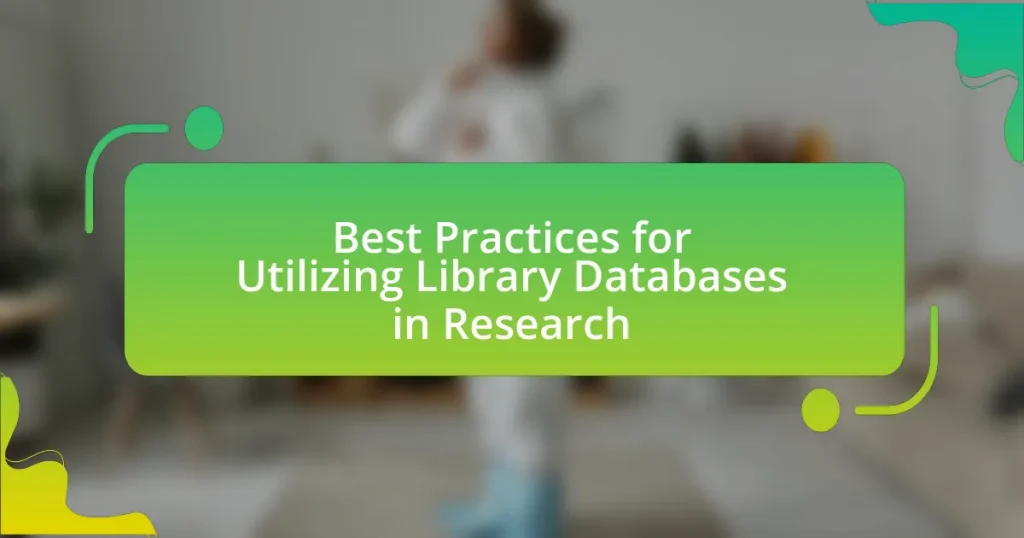The article focuses on best practices for utilizing library databases in research, emphasizing the importance of developing a clear research question, employing advanced search techniques, and critically evaluating sources. It outlines effective strategies for accessing and navigating library databases, understanding different database types, and optimizing search terms. Additionally, the article discusses the significance of evaluating source credibility and offers guidance on managing citations and staying organized during the research process. By implementing these practices, researchers can enhance the efficiency and quality of their information retrieval and overall research outcomes.

What are the Best Practices for Utilizing Library Databases in Research?
The best practices for utilizing library databases in research include developing a clear research question, using advanced search techniques, and evaluating sources critically. A clear research question guides the search process, ensuring that relevant databases are selected. Advanced search techniques, such as Boolean operators and filters, enhance the precision of search results, allowing researchers to find specific information efficiently. Evaluating sources critically involves assessing the credibility, relevance, and accuracy of the information retrieved, which is essential for maintaining research integrity. These practices are supported by studies indicating that structured search strategies significantly improve research outcomes and information retrieval efficiency.
How can researchers effectively access library databases?
Researchers can effectively access library databases by utilizing institutional credentials to log in, ensuring they have the necessary permissions for full access. Many academic libraries provide remote access to their databases through a secure login system, allowing researchers to retrieve articles, journals, and other resources from anywhere. Additionally, researchers should familiarize themselves with the specific database interfaces and search functionalities, as each database may have unique features that enhance search efficiency. Training sessions and tutorials offered by libraries can further improve researchers’ skills in navigating these resources.
What steps should be taken to log in to library databases?
To log in to library databases, first, access the library’s website or portal. Next, locate the login section, which typically requires your library credentials, such as a student or library ID and password. After entering the required information, click the login button to gain access to the databases. This process is standard across most academic and public libraries, ensuring secure access to a range of resources.
How can researchers navigate the library database interface?
Researchers can navigate the library database interface by utilizing search functionalities, filters, and help resources effectively. The search functionalities allow researchers to input keywords, phrases, or Boolean operators to refine their queries. Filters, such as date range, publication type, and subject categories, help narrow down results to the most relevant materials. Additionally, many library databases offer tutorials, user guides, and customer support to assist users in understanding the interface and maximizing their search efficiency. These features are designed to enhance the research process by providing structured access to a vast array of academic resources.
Why is it important to understand database types?
Understanding database types is crucial because it directly impacts the efficiency and effectiveness of data retrieval and management. Different database types, such as relational, NoSQL, and graph databases, are designed for specific use cases and data structures. For instance, relational databases excel in structured data and complex queries, while NoSQL databases are optimized for unstructured data and scalability. Recognizing these distinctions allows researchers to select the most appropriate database for their specific needs, thereby enhancing the quality of their research outcomes.
What are the different types of library databases available?
Library databases are categorized into several types, including bibliographic databases, full-text databases, numeric and statistical databases, multimedia databases, and institutional repositories. Bibliographic databases, such as PubMed and Scopus, provide citations and abstracts for academic articles, while full-text databases, like JSTOR and ProQuest, offer complete articles. Numeric and statistical databases, such as ICPSR, contain quantitative data sets, and multimedia databases, like Artstor, provide access to images and videos. Institutional repositories store and provide access to the scholarly output of a specific institution, including theses and dissertations. Each type serves distinct research needs, facilitating access to a wide range of information sources.
How do different database types impact research outcomes?
Different database types significantly impact research outcomes by influencing the accessibility, quality, and relevance of information available to researchers. For instance, scholarly databases like JSTOR and PubMed provide peer-reviewed articles that enhance the credibility of research findings, while general databases like Google Scholar may include non-peer-reviewed sources, potentially compromising the reliability of the information. Additionally, specialized databases cater to specific fields, offering targeted resources that can lead to more precise and relevant research outcomes. Studies have shown that using discipline-specific databases can improve the quality of literature reviews and overall research effectiveness, as they often contain curated content that aligns closely with the researcher’s area of study.
What strategies enhance the effectiveness of database searches?
Effective database searches can be enhanced through the use of specific strategies such as employing advanced search techniques, utilizing Boolean operators, and refining search terms. Advanced search techniques allow users to filter results by date, publication type, or subject area, which increases the relevance of the retrieved information. Boolean operators, such as AND, OR, and NOT, help in combining or excluding keywords to narrow down search results effectively. Additionally, refining search terms by using synonyms or related terms can broaden the search scope and yield more comprehensive results. Research indicates that users who apply these strategies experience a significant increase in the relevance and quality of their search outcomes, as evidenced by studies showing improved retrieval effectiveness when advanced techniques are utilized.
How can keywords and search terms be optimized?
Keywords and search terms can be optimized by using specific, relevant phrases that accurately reflect the content being searched. This involves conducting thorough research to identify commonly used terms in the field, utilizing synonyms, and employing Boolean operators to refine search results. For instance, a study by the American Library Association indicates that using quotation marks for exact phrases and the minus sign to exclude terms can significantly enhance search precision. Additionally, analyzing search logs can provide insights into effective keywords, allowing researchers to adapt their strategies based on actual user behavior.
What advanced search techniques can be employed?
Advanced search techniques that can be employed include Boolean operators, phrase searching, truncation, and field searching. Boolean operators, such as AND, OR, and NOT, allow users to combine or exclude keywords to refine search results. Phrase searching, achieved by placing quotes around a set of words, retrieves exact matches for that phrase, enhancing specificity. Truncation, indicated by symbols like an asterisk, enables searches for variations of a root word, broadening the scope of results. Field searching allows users to target specific sections of a database, such as title, author, or subject, ensuring more relevant results. These techniques are supported by library database functionalities that enhance the precision and relevance of search outcomes.
How can researchers evaluate the quality of sources found in databases?
Researchers can evaluate the quality of sources found in databases by assessing criteria such as authority, accuracy, objectivity, currency, and coverage. Authority involves checking the author’s credentials and the publication’s reputation; for instance, peer-reviewed journals are generally more reliable. Accuracy requires verifying the information against other credible sources, ensuring it is free from errors. Objectivity entails analyzing the purpose of the source to identify any potential bias, while currency assesses whether the information is up-to-date and relevant to the research topic. Coverage examines the depth and breadth of the content, ensuring it comprehensively addresses the research question. These criteria collectively help researchers determine the reliability and relevance of sources for their work.
What criteria should be used to assess source credibility?
To assess source credibility, one should evaluate the authority, accuracy, objectivity, currency, and coverage of the source. Authority refers to the qualifications and expertise of the author or organization behind the information, ensuring they have relevant credentials. Accuracy involves verifying the information against other reliable sources to confirm its correctness. Objectivity assesses whether the source presents information fairly without bias, while currency checks if the information is up-to-date and relevant to the current context. Lastly, coverage examines the comprehensiveness of the source, ensuring it addresses the topic thoroughly. These criteria are essential for ensuring that the information used in research is reliable and trustworthy.
How can researchers identify peer-reviewed articles?
Researchers can identify peer-reviewed articles by utilizing library databases that specifically filter for scholarly content. Many academic databases, such as JSTOR, PubMed, and Scopus, offer options to limit search results to peer-reviewed journals. Additionally, researchers can check the journal’s website for information on its peer-review process, which is often detailed in the “About” section. Furthermore, tools like Ulrich’s Periodicals Directory can confirm whether a journal is refereed, indicating that it employs a peer-review process. These methods ensure that the articles accessed are credible and have undergone rigorous evaluation by experts in the field.
What are common challenges faced when using library databases?
Common challenges faced when using library databases include difficulty in navigating complex interfaces, limited access to certain materials, and issues with search functionality. Users often struggle with the intricate layout of databases, which can hinder efficient information retrieval. Additionally, some databases may restrict access to specific journals or articles due to licensing agreements, limiting the breadth of available resources. Furthermore, search functionalities may yield irrelevant results or fail to recognize synonyms and related terms, complicating the research process. These challenges can significantly impact the effectiveness of research conducted through library databases.
How can researchers overcome access issues with databases?
Researchers can overcome access issues with databases by utilizing institutional subscriptions and interlibrary loan services. Many academic institutions provide access to a wide range of databases through their library systems, allowing researchers to log in with their institutional credentials. Additionally, interlibrary loan services enable researchers to request materials not available in their home institution’s library, facilitating access to necessary resources. According to a study published in the Journal of Academic Librarianship, 75% of researchers reported that institutional access significantly improved their ability to obtain needed information.
What troubleshooting steps can be taken for search failures?
To address search failures in library databases, users should first verify their search terms for accuracy and relevance. Ensuring that keywords are spelled correctly and appropriately reflect the topic can significantly improve search results. Additionally, users should check the database’s filters and settings, as incorrect filters may limit search results.
If issues persist, clearing the browser cache or trying a different browser can resolve technical glitches that affect search functionality. Users should also consider consulting the database’s help section or user guides, which often provide specific troubleshooting tips tailored to that platform. Finally, reaching out to library support staff can provide personalized assistance and resolve persistent search issues effectively.
How can researchers stay organized while using library databases?
Researchers can stay organized while using library databases by employing systematic methods such as creating a research plan, utilizing citation management tools, and maintaining a well-structured digital folder system. A research plan outlines specific goals, timelines, and key questions, which helps in focusing the search and tracking progress. Citation management tools like Zotero or EndNote assist in collecting, organizing, and formatting references efficiently, ensuring that researchers can easily retrieve and cite sources. Additionally, a structured digital folder system allows researchers to categorize articles and documents by topic or project, facilitating quick access and reducing the risk of losing important information. These practices enhance efficiency and clarity in the research process.
What tools can assist in managing citations and references?
Tools that can assist in managing citations and references include citation management software such as Zotero, Mendeley, and EndNote. These tools allow users to collect, organize, and format citations efficiently, streamlining the research process. For instance, Zotero enables users to save references directly from web browsers and automatically generate bibliographies in various citation styles, which enhances accuracy and saves time. Mendeley offers similar features along with collaboration tools for sharing research with peers. EndNote provides advanced options for managing large libraries of references and integrates with word processors for seamless citation insertion. These tools are widely recognized in academic settings for their effectiveness in improving citation management.
How can researchers keep track of their search history?
Researchers can keep track of their search history by utilizing the built-in features of library databases, which often include search history logs and saved searches. These features allow researchers to view their previous queries, refine their search strategies, and revisit relevant results. For instance, many academic databases like JSTOR and PubMed automatically save search history for user accounts, enabling easy access to past searches. Additionally, researchers can manually document their search terms and results in a research log or use reference management software like Zotero or EndNote, which can also track sources and notes related to their searches.
What are the best practices for utilizing library databases effectively?
To utilize library databases effectively, users should start by clearly defining their research topic and formulating specific keywords related to it. This approach enhances search precision and relevance. Additionally, employing advanced search techniques, such as Boolean operators (AND, OR, NOT), can refine results and filter out irrelevant information. Familiarizing oneself with the database’s interface and available tools, such as citation generators and subject-specific filters, further optimizes the search process.
Moreover, utilizing the database’s help resources, including tutorials and librarian assistance, can provide valuable insights into maximizing database features. Regularly reviewing and adjusting search strategies based on initial results ensures that users remain on track to find the most pertinent information. These practices are supported by research indicating that structured search strategies significantly improve information retrieval success rates in academic settings.
How can researchers create a research plan using library databases?
Researchers can create a research plan using library databases by first identifying their research question and then selecting relevant databases that align with their topic. They should conduct preliminary searches to gather background information and refine their research question based on initial findings. Next, researchers can develop a structured search strategy, utilizing keywords, Boolean operators, and filters to narrow down results effectively.
To ensure comprehensive coverage, they should take advantage of the advanced search features offered by databases, such as subject headings and citation tracking. Additionally, researchers can organize their findings using reference management tools, which facilitate the citation process and help maintain an organized bibliography. This systematic approach is supported by studies indicating that structured search strategies significantly improve the quality and relevance of research outcomes.
What tips can enhance the overall research experience with databases?
To enhance the overall research experience with databases, users should utilize advanced search features effectively. Advanced search options allow researchers to refine their queries using specific fields, such as author, title, or subject, which increases the precision of search results. For example, using Boolean operators like AND, OR, and NOT can help narrow or broaden searches based on the researcher’s needs. Additionally, familiarizing oneself with the database’s thesaurus or subject headings can lead to more relevant results by aligning search terms with the database’s indexing. Research indicates that effective use of these features can significantly improve the relevance and quality of retrieved information, as demonstrated in studies on information retrieval effectiveness.






